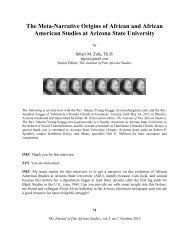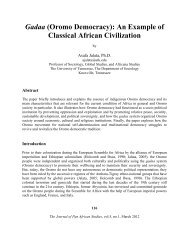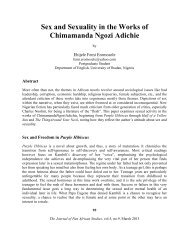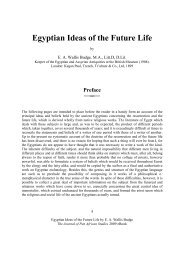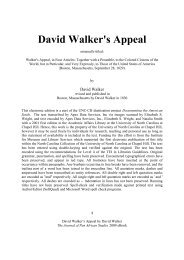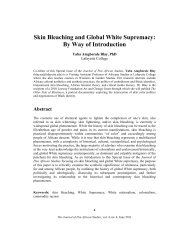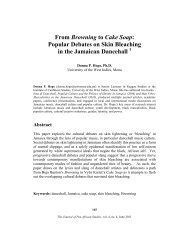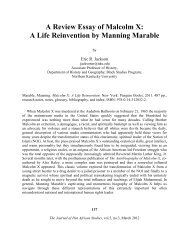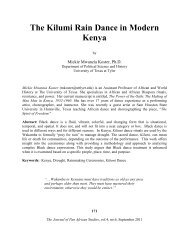Jacob H. Carruthers and the African - Journal of Pan African Studies
Jacob H. Carruthers and the African - Journal of Pan African Studies
Jacob H. Carruthers and the African - Journal of Pan African Studies
Create successful ePaper yourself
Turn your PDF publications into a flip-book with our unique Google optimized e-Paper software.
<strong>and</strong> culture in <strong>the</strong> wake <strong>of</strong> <strong>the</strong> European conquest. Instead he argued that <strong>African</strong>s had to reclaim<br />
an <strong>African</strong> Historiography, but in order to do this <strong>the</strong>y would first have to develop an <strong>African</strong>-<br />
Centered worldview.<br />
<strong>Carru<strong>the</strong>rs</strong> states that worldview “…includes <strong>the</strong> way a people conceive <strong>of</strong> <strong>the</strong><br />
fundamental questions <strong>of</strong> existence <strong>and</strong> organization <strong>of</strong> <strong>the</strong> universe” (<strong>Carru<strong>the</strong>rs</strong> 1994, 53). In<br />
this sense worldview is inextricably linked to culture, identity, social organization, <strong>and</strong> so forth.<br />
Worldview is <strong>the</strong> epistemological glue that holds cultural systems toge<strong>the</strong>r. He argued that in <strong>the</strong><br />
absence <strong>of</strong> an <strong>African</strong>-Centered worldview, <strong>African</strong>a scholars would be unable to decouple<br />
<strong>the</strong>mselves from <strong>the</strong> interests, perspectives, methods, <strong>and</strong> goals <strong>of</strong> Europeans. This was<br />
important, as European knowledge systems have been constructed in a manner consistent with a<br />
global political economy in which Europeans are superordinate <strong>and</strong> <strong>African</strong>s subordinate.<br />
<strong>Carru<strong>the</strong>rs</strong> argued that in order to truly effect <strong>the</strong> liberation <strong>of</strong> <strong>the</strong> <strong>African</strong> masses <strong>and</strong> reorder <strong>the</strong><br />
global political-economy, an <strong>African</strong>-Centered worldview was imperative. This <strong>African</strong>-Centered<br />
worldview would provide <strong>the</strong> epistemological <strong>and</strong> structural bases for an emancipatory social<br />
order <strong>and</strong> <strong>the</strong> restoration <strong>of</strong> <strong>African</strong> civilization (<strong>Carru<strong>the</strong>rs</strong> 1999). Yet, while <strong>Carru<strong>the</strong>rs</strong><br />
advocated for a diffuse approach to <strong>the</strong> dissemination <strong>of</strong> <strong>African</strong>-Centered knowledge<br />
production, he also recognized <strong>the</strong> critical role that <strong>African</strong>a scholars played in such a struggle.<br />
In describing <strong>the</strong> nature <strong>of</strong> <strong>the</strong> intellectual war in which critical <strong>African</strong>a scholars were<br />
embroiled, <strong>Carru<strong>the</strong>rs</strong> argued that <strong>the</strong>y were compelled to fight on two fronts.<br />
…those who have been waging <strong>the</strong> long war to liberate <strong>African</strong> history <strong>and</strong> culture have<br />
been fighting <strong>the</strong> following two battles: (1) an international war against European<br />
intellectuals <strong>and</strong> (2) a civil war against <strong>the</strong> colonized <strong>African</strong> spokespersons who are<br />
trained by Europeans to undermine <strong>African</strong> independence. The war is truly, as Anderson<br />
Thompson says, a battle for <strong>the</strong> <strong>African</strong> mind, or as Asa Hilliard <strong>and</strong> <strong>the</strong> First World<br />
Alliance put it, a battle to free <strong>the</strong> <strong>African</strong> mind. (<strong>Carru<strong>the</strong>rs</strong> 1999, 4)<br />
The conceptualization <strong>of</strong> <strong>African</strong>a scholars <strong>and</strong> <strong>the</strong> field <strong>of</strong> <strong>African</strong>a <strong>Studies</strong> as a key<br />
battleground for <strong>African</strong> self-determination was a major concern <strong>of</strong> <strong>Carru<strong>the</strong>rs</strong>. While he<br />
advocated for broad-based participation in this intellectual war (<strong>Carru<strong>the</strong>rs</strong> 1999, 16), he<br />
envisioned <strong>African</strong>a scholars as providing <strong>the</strong> critical intellectual leadership to this movement<br />
(<strong>Carru<strong>the</strong>rs</strong> 1994). To this end he queried, <strong>and</strong> in doing so echoed E. Franklin Frazier (Caru<strong>the</strong>rs<br />
1994; Frazier 1973) <strong>and</strong> Harold Cruse (1967), as to whe<strong>the</strong>r <strong>African</strong>a scholars were simply <strong>the</strong><br />
instrumental by-products <strong>of</strong> <strong>the</strong>ir European-Centered training, or whe<strong>the</strong>r <strong>the</strong>y had broken <strong>the</strong>ir<br />
chains <strong>and</strong> joined <strong>the</strong> struggle for <strong>African</strong> liberation. <strong>Carru<strong>the</strong>rs</strong> sought to situate <strong>the</strong> field <strong>of</strong><br />
<strong>African</strong>a <strong>Studies</strong> within <strong>the</strong> vast historical continuum <strong>of</strong> world <strong>African</strong> history (<strong>Carru<strong>the</strong>rs</strong> 1997),<br />
to link <strong>the</strong> study <strong>of</strong> <strong>African</strong> history to <strong>the</strong> process <strong>of</strong> cultural transformation, <strong>and</strong> to compel<br />
scholars in <strong>the</strong> field <strong>of</strong> <strong>African</strong>a <strong>Studies</strong> to reconceptualize <strong>the</strong>ir roles, not merely as intellectual<br />
pacifists, but as intellectual warriors committed to <strong>the</strong> unimpeded recovery <strong>of</strong> <strong>African</strong> history <strong>and</strong><br />
culture <strong>and</strong> <strong>the</strong> restoration <strong>of</strong> global <strong>African</strong> sovereignty.<br />
27<br />
The <strong>Journal</strong> <strong>of</strong> <strong>Pan</strong> <strong>African</strong> <strong>Studies</strong>, vol.5, no.4, June 2012



